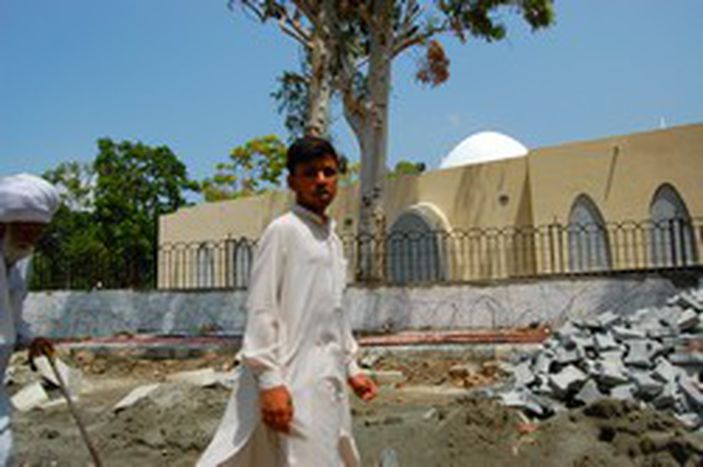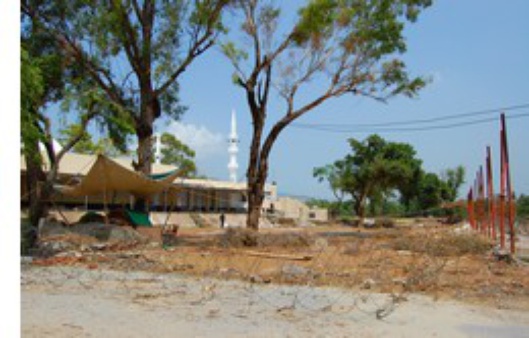
Walking the Lal Masjid mile
Published on
On 10 and 15 September former prime ministers Sharif and Bhutto plan leaving London for upcoming elections in Pakistan. Military president Musharraf was hit hard by the ten-day ‘Red Mosque’ siege by armed fundamentalists in July
The young driver is lost. In the August heat and lunchtime traffic of Pakistan's capital, various drivers motion toward the permanent black outlines of the Margalla Hills on the horizon. The climate is apprehensive even in asking directions. Blue and white road signs flag up the heart of Islamabad – the Faisal Mosque and the famous shopping district, the ‘Blue Area’.
The Lal Masjid ('Red Mosque'), endorsed by the former Islamist military dictator General Mohammed Zia-Ul-Haq (1978-88), is no tourist spot. Between 3 - 10 July, pro-Taliban armed militants laid siege in it and two madrasas (seminaries) alongside it in protest at current president and army chief General Pervez Musharaff, who seized power in a 1999 military coup. Ordinary Pakistanis are still trying to appreciate the tragedy where over 100 died, including children who became human shields and hostages at the Jamia Hafsa madrasa (women's seminary). 'You just can't call Islamic law on a capital,' reflects Ashfaq Raja, UK information secretary for former prime minister Benazir Bhutto's liberal, secular Pakistan Popular Party (PPP).
Secure, silent
 The mosque itself looks intact but bruised from afar. Its lower half is no longer red. The Aabpara bazaar leading to it is crowded with bricks and stones. A huge gaping desert complete with army checkpoint stretches to the mosque's left, where the madrasa was razed to the ground. Officers are positioned behind sandbags, above barbed wire, on the verandah of the secured complex. We avoid the glare of the guards by merging into a family of passer-bys standing at 'Lal Masjid Road', which divides the mosque's entrance. 'This was where all those women's daughters died,' says one lady, ignoring an officer gesticulating madly a few feet away that she has no business there.
The mosque itself looks intact but bruised from afar. Its lower half is no longer red. The Aabpara bazaar leading to it is crowded with bricks and stones. A huge gaping desert complete with army checkpoint stretches to the mosque's left, where the madrasa was razed to the ground. Officers are positioned behind sandbags, above barbed wire, on the verandah of the secured complex. We avoid the glare of the guards by merging into a family of passer-bys standing at 'Lal Masjid Road', which divides the mosque's entrance. 'This was where all those women's daughters died,' says one lady, ignoring an officer gesticulating madly a few feet away that she has no business there.
‘People were still finding pieces of hand, feet, girls plaits and scraps of the Koran in the drains a month later,’ says a taxi driver from Attok, who has been driving in Islamabad and twin city Rawalpindi for 47 years. 'The army is cruel - the bodies weren’t taken away immediately.' Raja also describes how weeks later when Friday prayers resumed, bloody remains were still being found inside the mosque. ‘The government is too cruel,’ echoes another driver. ‘They killed under-sevens when they stormed the mosque to get the militants out.’
The extremist side
An 18-minute long VCD tells the side of the pro-Taliban extremists. Allah-hu-akbar allah - the movie begins with the call to prayer. It zooms out on the white dome and minaret of the mosque, which is filmed through tree branches. The counter dates 7 July 2007 - five days into the siege against the president's rule, which also targetted prostitutes and Bollywood music and video shops.
Gunshot sounds interrupt the video, bulleting the images of protagonists. Musharaff and US president George Bush shaking hands. The blood-stained face of a dead imam, his mouth open in a toothy grimace. A burka-clad girl, the news banner around 17 million students attend Pakistan madrasas.
‘From early morning until evening I went to the madrasa to read the Koran,’ shrills a student in an interview on the VCD. She was inside the mosque during the siege. 'I tried to pick up all the corpses of my friends. My hands were blood-red.' As her high voice breaks, the camera widens to a black-clad figure beside her, her naked hand shaking as she cries. Some madrasa students in Islamabad - many children of the wealthy and army officers themselves - wielded sticks during the siege, some concealing weapons for the militant ringleaders.
I’ve met madrasa students before, in rural areas too, and it's hard to believe where the fanaticism could come in so strongly. Most have learnt much of the Koran off by heart by the age of twelve. In a different ‘extreme’ high up in the mountain village of Abbottabad, at the beginning of the long Karokaram highway route leading to China, Rabia is unable to produce any of her parents' wedding photos for me. She burnt them all - the West knows well that pictures of the prophet Muhammed shouldn't exist, and it seems nor of her family. ‘What’s the point of me going to a madrasa and learning these words if I don’t put them into practice?’
Electing a fair, free future
Driving away from the mosque, a token white headscarf dots an election poster under a bridge. Former prime minister Benazir Butto announces when she leaves her seven-year London exile on 15 September. The media frenzy of her ‘power-sharing deal’ with Musharaff means that if general elections are held at the end of December, Bhutto will become a likely future prime minister and Musharaff remain president, but no longer army head. He already re-deported former premier and challenger Nawaz Sharif (of the ruling Muslim League party, PML-N) to Saudi Arabia on 10 September. Internal peek-a-boo politics continue, the tragedy is remembered, whilst the EU deals with the next step: organising an election observer mission to Pakistan, to follow up on the last 'flawed' elections in 2002.



